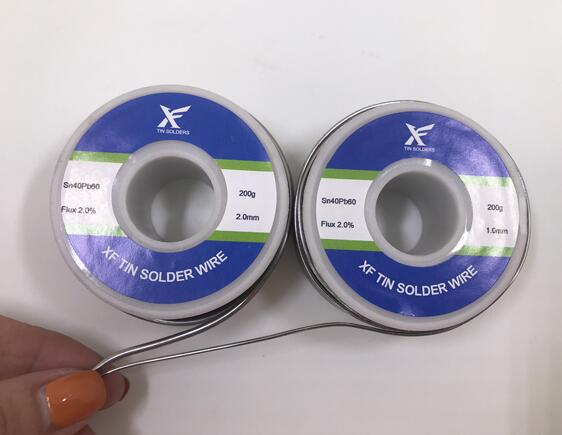Solder wire lead or lead free
Solder wire lead or lead free

Solder wires can be classified into two types depending on whether it contains or not. The type of solder wire lead is lead containing alloy, consisted of tin & lead at different composition; The other type of solder wire lead free is consisted of tin, silver and copper without lead, that complies with ROHS.
How many types of solder wire lead and lead free respectively?
The solder wire lead is available in below compositions:
Solder wire lead 63/37: the eutectic solder alloy, with low melting point at 183℃, excellent solder-ability, most expensive solder alloy among the tin/lead solder family but still much cheaper comparing to solder wire lead free.
Solder wire lead 60/40: Very similar solder wire to the solder wire 63/37, for most of the users can't tell the exact difference, but in most general soldering case, the solder wire 60/40 can fully replace the solder wire 63/37 except for some high precision applications.
Solder wire lead 40/60: A medium quality grade of the tin/lead solder wire. About 1/3 cheaper than the solder wire 63/37. It's used for soldering of medium quality requirement of electronic soldering, or used for soldering of plumbings (copper pipes and fittings).
Other solder wire lead composition is available, such as solder wire 10/90, or solder wire 5/95 etc.
The solder wire lead free is available in below compositions:
Solder wire lead free SAC305: this is composed of 3.0% silver and 0.5% copper solder wire, expensive solder wire but excellent solder-ability, the best solder alloy out of the solder wire lead free family.
Solder wire lead free SAC0307: a low silver solder alloy, keeps basic property of SAC305 but at much affordable price, at least 2/5 cheaper.
Solder wire lead free SAC07: A solder wire consisted of tin and copper, the cheapest solder wire lead free out of the three, used for general solder purpose.
Choose Solder wire lead or lead free?
1. Check the applications. If the components or stuffs that you're going to solder requires lead free, such as home appliances that needs to complies with ROHS, or soldering or drinking water pipes, then only option is to choose solder wire lead free, because the solder wire lead is banned.
2. Consider the cost. If you're free to use both types, then it's up to your budget, if your budget allows, you can go with solder wire lead free for a more environmental friendly material.
3. Personal preference. Basing on the feedback from the people who carry out the soldering, a tin lead solder alloy is easier to use comparing to the solder wire lead. Especially when the flux core contains halide, a solder wire lead is better as the lead can help to constrain the halide to cause damaging of soldering joint in a long run.
Contact us if you need more information about solder wire lead or lead free. Email: xfsolder@gmail.com or xfsolder@163.com ; Whatsapp/Wechat: 008613450770997
